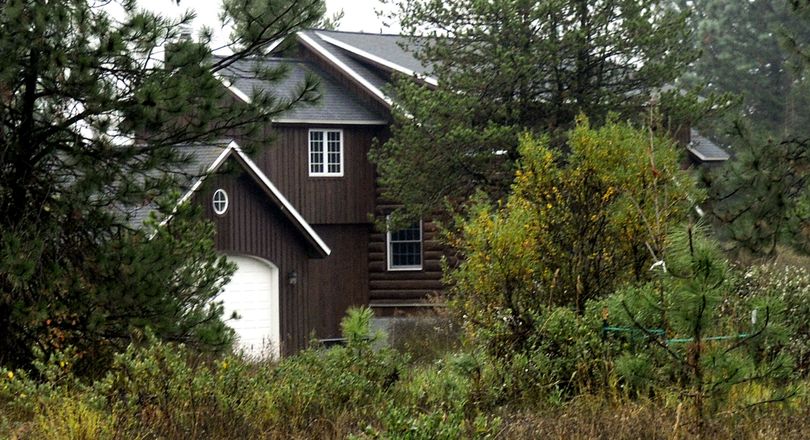Federal judge clears way for foreclosure on former Rep. Hart’s log home

A federal judge has cleared the way for the Internal Revenue Service to foreclose on former state Rep. Phil Hart's Athol, Idaho log home over years of unpaid taxes, the AP reports. U.S. District Judge Edward Lodge ruled last week that Hart, a Republican, was still the true owner of the log home and that his attempt to transfer the property to a trust was ineffective. The judge also said Hart couldn't claim a "head of household" tax exemption because he had no dependents at the time.
Hart, who lost his bid for a fifth term in the Idaho House last year, stopped filing income tax returns in 1996 while he pursued a federal lawsuit challenging the constitutionality of the federal income tax. He lost the lawsuit and the IRS is seeking to collect more than half a million dollars in back taxes, penalties and interest. His home was built partly with logs taken from state school endowment land; Hart never fully satisfied a court judgment over the timber theft. He claimed as a citizen he was entitled to take the logs. Click below for a full report from AP reporter Rebecca Boone.
By the way, the reason that the foreclosure can proceed even though Hart's filed a third bankruptcy case is that a federal bankruptcy judge ruled in late February that Hart's third bankruptcy filing in one year is not entitled to an automatic stay on the foreclosure case, like the last two prompted. "The bankruptcy, when viewed in light of Debtor's previous two filings, appears intended to halt the progress of the federal litigation," wrote U.S. Bankruptcy Judge Terry Myers, adding that Hart's petitions were "filed without regard to eligibility but with an eye toward delay and potential forum shopping."
Federal judge says IRS can foreclose Hart's home
By REBECCA BOONE, Associated Press
BOISE, Idaho (AP) — A federal judge has cleared the way for the Internal Revenue Service to foreclose on former state Rep. Phil Hart's North Idaho home over years of unpaid taxes.
U.S. District Judge Edward Lodge ruled last week that Hart, a Republican from Athol, was still the true owner of the log home and that his attempt to transfer the property to a trust was ineffective. The judge also said Hart couldn't claim a "head of household" tax exemption because he had no dependents at the time.
Hart, who lost his bid for a fifth term in the Idaho House last year, stopped filing income tax returns in 1996 while he pursued a federal lawsuit challenging the constitutionality of the federal income tax. He lost the lawsuit and the IRS is seeking to collect more than half a million dollars in back taxes, penalties and interest.
Hart is in the midst of his third bankruptcy filing in a year, but unlike the first two, the third wasn’t allowed to automatically stay the foreclosure case. “The bankruptcy, when viewed in light of Debtor's previous two filings, appears intended to halt the progress of the federal litigation,” wrote U.S. Bankruptcy Judge Terry Myers in a late-February decision, adding that Hart's petitions were “filed without regard to eligibility but with an eye toward delay and potential forum shopping.”
The court is still trying to work out exactly how much Hart owes in taxes and penalties as the former lawmaker and federal attorneys battle over exemptions, deductions and other aspects of the tax code. But in the order granting partial summary judgment in the case to the federal government, Lodge said the amount Hart owes for back taxes and penalties for the year of 1996 is well established at more than $25,000.
It's too soon to impose summary judgment on the rest of the tax years, Lodge found, because the total amount he owes hasn't been determined yet.
"There is little doubt that the four types of penalties and interest payments identified by the United States will be imposed against Mr. Hart," Lodge wrote. "The impositions of such penalties and interest, however, will be made after the tax liabilities are determined."
Lodge rejected Hart's attempt to claim tax deductions under his "head of household" status. To qualify as head of household, Lodge said Hart would have had to show that he wasn't married at the close of the relevant tax year, that he didn't qualify as a surviving spouse, and that he maintained a household that included a qualifying child or dependent for more than half the year.
The judge said it's undisputed that Hart's daughter, Sarah Elizabeth Hart, wasn't a qualifying child or dependent because he didn't have primary physical custody and because she only stayed with him a couple of months out of the year.
According to the court documents, Hart transferred his property to White Peak Ventures on Aug. 8, 1997, and the next day, White Peak Ventures transferred the property to the Sarah Elizabeth Hart Trust. But Lodge said that neither recipient actually purchased the property, and so the supposed transfers weren't valid.
Moreover, Mr. Hart himself has conceded that the 'United States is entitled to foreclose on the real property' and 'foreclosure is imminent,'" Lodge noted.
Hart built the home in part with trees he cut illegally from Idaho state school endowment land; he contended that as a citizen, he was entitled to take the logs, but that arguments was rejected repeatedly in court. He never fully satisfied a court judgment over the timber theft.
